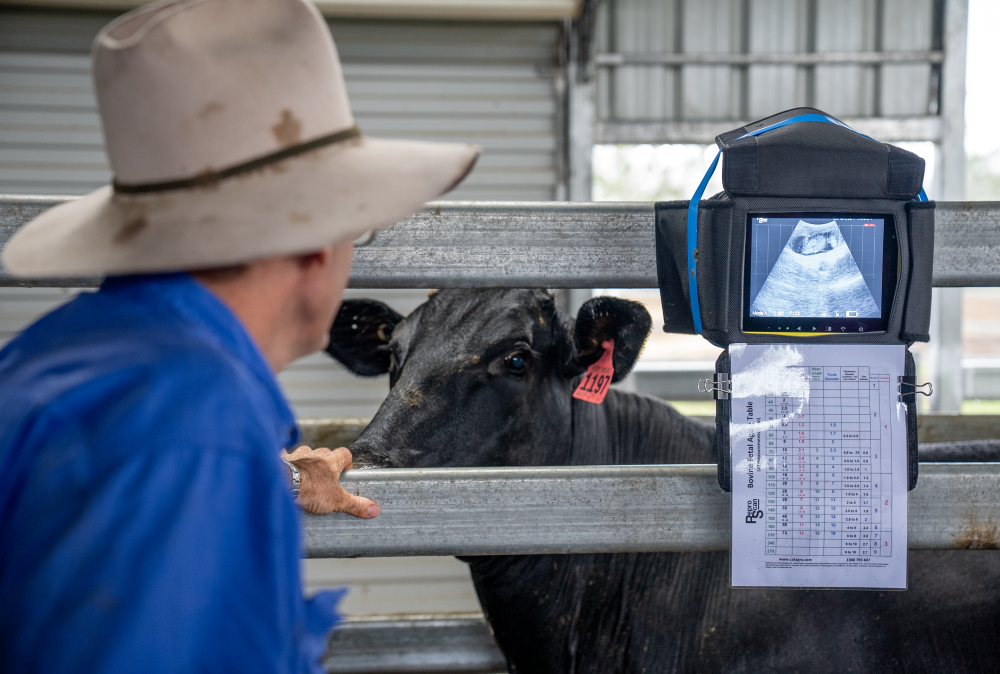Aussie meat in high demand despite international beef
Australian beef is a hot commodity despite trade tussles with China and the United States, while domestic prices wane as farmers recover from floods...

Pregnancy status is one of the most critical details when trading females on AuctionsPlus. Whether buyers are looking to introduce new genetics or vendors are preparing to sell, accuracy around breeding information shapes outcomes for both sides.
Chloe Pike, Integrity Lead at AuctionsPlus, said pregnancy information could make or break a breeding program.
“Getting it wrong can add unexpected costs, throw out breeding timelines, and cause major management headaches,” Ms Pike said. “That is why AuctionsPlus has clear safeguards in place, and why we encourage both buyers and vendors to do their due diligence.”
Pregnancy is a protected trait on AuctionsPlus, provided females have not been continuously joined. For PTIC cattle, up to 5% of animals are allowed to be empty, while the tolerance is 10% for SIL sheep and goats. Anything outside those levels could support a valid claim from buyers, who are required to declare their intention to scan within 48 hours of delivery.
Timing of progeny birth also matters - and is the most common issue the Integrity Team handles regarding female livestock.
"If you are expecting calves/lambs to be dropping and they are not, or a calf/lamb drops much earlier than expected, even if it is just one, we encourage you to contact us to discuss options," Ms Pike said.
Based on joining dates, there is a two-week tolerance either side of the expected window for calves or lambs to drop, with only 5% allowed outside this range.
To be listed as PTIC or SIL, females had to be scanned within 30 days of the assessment, with details of who conducted the test, when it occurred and the results included. Certificates were not always provided as standard, but Miss Pike said they were well worth asking for.
“Not all scanners issue certificates, but we encourage assessors to sight them, and buyers can always ask. Doing that bit of homework upfront can save a lot of hassle later,” she said.
While risk transferred to buyers once stock were on the truck, disputes still arose. Common issues included progeny dropping outside of expected windows, or NSM females found to be in calf. In one case, NSM ewes were mistakenly joined when a neighbour’s ram broke through a fence. The assessor worked with the buyer and vendor to negotiate a price adjustment, and the ewes were later successfully re-joined and on-sold.
Ms Pike advised buyers to always request certificates where possible, act quickly if issues arise, and contact assessors with any questions before bidding.
For vendors, she said the message was to be upfront with joining details, provide accurate testing information and remember that transparency built trust and stronger competition at auction.
“You were not just buying off a description,” Ms Pike said. "AuctionsPlus assessments contain more detailed information than you would find out of a saleyard or direct paddock sale. We also have the specified terms to protect and support negotiations should anything go wrong so buyers should feel confident when buying stock on AuctionsPlus that their purchase will go smoothly, and if it doesn’t we are there to support.”
Pregnancy is protected
PTIC cattle have a 5% tolerance for empties, SIL sheep and goats 10%. Anything outside these levels may support a valid claim.
Certificates matter
Preg testing must be done within 30 days of assessment. Always ask for a certificate where possible.
Timing is critical
Progeny must drop within two weeks either side of nominated joining dates, with only 5% allowed outside the window.
NSM isn’t a guarantee
SM does not mean pregnant, it means they have been joined. NSM does not mean empty, it means they have not been intentionally joined.
Act fast if issues arise
Buyers must flag preg testing within 48 hours of delivery and follow AuctionsPlus claim processes if there’s a problem.

Australian beef is a hot commodity despite trade tussles with China and the United States, while domestic prices wane as farmers recover from floods...

Stay up to date with the latest livestock trends AuctionsPlus brings you the latest insights from Australia’s livestock markets, direct to the...
.jpg)
Mortgage holders will face higher borrowing costs after the Reserve Bank raised interest rates by 0.25 percentage points in a widely-anticipated...